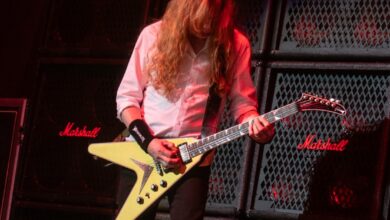Slash & Myles Kennedy’s “Crazy Train” Live Reinvents Ozzy’s Anthem with Fiery Flair
When Slash featuring Myles Kennedy & The Conspirators unleashed their rendition of “Crazy Train” live, it was more than homage—it was a rebirth. Originally immortalized by Ozzy Osbourne in 1980, the song took on new life when Slash brought it to stages worldwide starting in late 2014. This version marked a high point in Slash’s solo career, combining his iconic guitar tone with Kennedy’s blistering vocals to create a performance that’s both reverential and powerful.
Slash, born Saul Hudson, first rose to fame as the lead guitarist of Guns N’ Roses, defined by his signature Les Paul riffs and top-hatted silhouette. His post-GNR work included Slash’s Snakepit and Velvet Revolver, but his 2010 solo project with Myles Kennedy announced a new chapter. The pairing showcased Slash’s return to bluesy, riff-heavy rock, while Kennedy—known from Alter Bridge—brought vocal dynamism and a wide range, setting the stage for their version of “Crazy Train.”
The duo first debuted the cover on November 9, 2014, at the MTV Europe Music Awards—Slash, Kennedy, and Simon Neil from Biffy Clyro united to honor Ozzy’s Global Icon award. That performance was electric: Slash acknowledged Ozzy’s stage presence and legacy, setting a tone of deep respect, while Simon Neil added extra spice. It transformed the track into a communal celebration of heavy metal history.
Their studio version also featured on the live-documented Live at the Roxy 9.25.14, released in mid‑2015, capturing the raw energy of their live sound. Producers prioritized authenticity—minimal overdubs, live mixing, and a sound that put Slash’s crunchy riffs upfront, while Kennedy’s vocals soared above in crisp clarity. The chemistry between guitar and voice felt immediate, visceral, and grounded in classic rock values.
Audience reception was immediate and effusive. Fans online applauded the precision of Kennedy’s vocal run through Plant-esque wails and Slash’s mastery of Page-inspired leads. Commentators noted that the performance didn’t replicate Ozzy’s version—it paid tribute by reinterpreting it. That harmony of nostalgia and innovation cemented it as one of the greatest live renditions of “Crazy Train.”
Culturally, the performance bridged generations of rock fans. It linked the early 1980s hard rock era with 21st-century virtuosity. Slash’s veteran status, combined with Kennedy’s modern bravado, showed that timeless anthems can be renewed—an invitation for fans of both classic rock and contemporary hard rock to unite under one riff.
For Slash’s career, the cover represented evolution. Already a legendary guitarist, he embraced a fuller sonic identity—one that featured a powerful vocalist performing alongside him. It underscored his solo project’s ambition: not just nostalgia, but forward momentum. For Kennedy, it expanded his repertoire, demonstrating his ability to channel Ozzy’s grit while maintaining his own vocal identity.
The performance inspired other artists; rock bands increasingly embraced classic covers in live sets, aiming for freshness rather than mimicry. It showed that a legendary track could be tread anew, with respect and creativity—encouraging a wave of reinterpretations across the genre.
Many have tried covering “Crazy Train”—from acoustic arrangements to symphonic renditions—but none matched the Slash/Kennedy electricity. Fans have noted that even Ozzy himself seemed impressed when he heard renditions like this on tour, acknowledging the power of a faithful yet reinvented approach.
This live cover aligned with Slash’s wider resurgence. During the “Let Rock Rule” touring cycle with Aerosmith in 2014, the performance became a standout moment. It became a fan-favorite encore, showcasing his confidence and reaffirming his status as a lead guitarist willing to revisit heavy metal’s roots.
On a personal level, the song represented Slash’s full embrace of solo artistry after surviving personal and health setbacks in the early 2000s. Partnered with Kennedy, he asserted his creative vitality through a song that symbolized resilience and rebellion.
Legacy-wise, the live rendition endures. Clips from the MTV EMAs and Roxy release still generate millions of views. Rock critics frequently cite it as one of the top live cover performances, often ranking it above other notable versions.
The performance also influenced expectations for live covers—showing that a single song, performed with conviction, can steal a headline slot and define a tour’s sound. It influenced setlists for many rock veterans aiming to rewrite classics live.
Award recognition followed—though DIY in nature, the performance drew industry nods and fan-voted accolades for live rock achievements. It became a highlight reel staple and concert hall bragging right.
In conclusion, Slash featuring Myles Kennedy’s live take on “Crazy Train” stands as a transformative moment in rock performance. It wasn’t a mere cover—it was a homage, a rebirth, and a declaration: legendary songs are renewed when played with integrity, energy, and heart.





